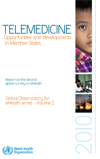
Information and communication technologies (ICTs) have great potential to address some of the challenges faced by both developed and developing countries in providing accessible, costeffective, high-quality health care services. Telemedicine uses ICTs to overcome geographical barriers, and increase access to health care services. This is particularly beneficial for rural and underserved communities in developing countries - groups that traditionally suffer from lack of access to health care.
In light of this potential, the World Health Organization (WHO) established the Global Observatory for eHealth (GOe) to review the benefits that ICTs can bring to health care and patients' wellbeing. The Observatory is charged with determining the status of eHealth solutions, including telemedicine, at the national, regional, and global level, and providing WHO's Member States with reliable information and guidance on best practices, policies, and standards in eHealth.
In 2005, following the formation of WHO's eHealth strategy, the Observatory conducted a global eHealth survey to obtain general information about the state of eHealth among Member States. Based on the data from that survey, the GOe carried out a second global survey in 2009; it was designed to explore eight thematic areas in detail, the results of each being reported and analysed in individual publications - the Global Observatory for eHealth series.
The eHealth series is primarily meant for government ministries of health, information technology, and telecommunications, as well as others working in eHealth - academics, researchers, eHealth professionals, nongovernmental organizations, and donors.
Download Telemedicine Opportunities and Developments in Member States (.pdf, 3.464 KB).
Download from eHealthNews.eu Portal's mirror: Telemedicine Opportunities and Developments in Member States (.pdf, 3.464 KB).
About Global Observatory for eHealth
The Observatory's mission is to improve health by providing Member States with strategic information and guidance on effective practices and standards in eHealth.
Its objectives are to:
- provide relevant, timely, and high-quality evidence and information to support national governments and international bodies in improving policy, practice, and management of eHealth;
- increase awareness and commitment of governments and the private sector to invest in, promote, and advance eHealth;
- generate knowledge that will significantly contribute to the improvement of health through the use of ICT; and
- disseminate research findings through publications on key eHealth research topics as a reference for governments and policy-makers.